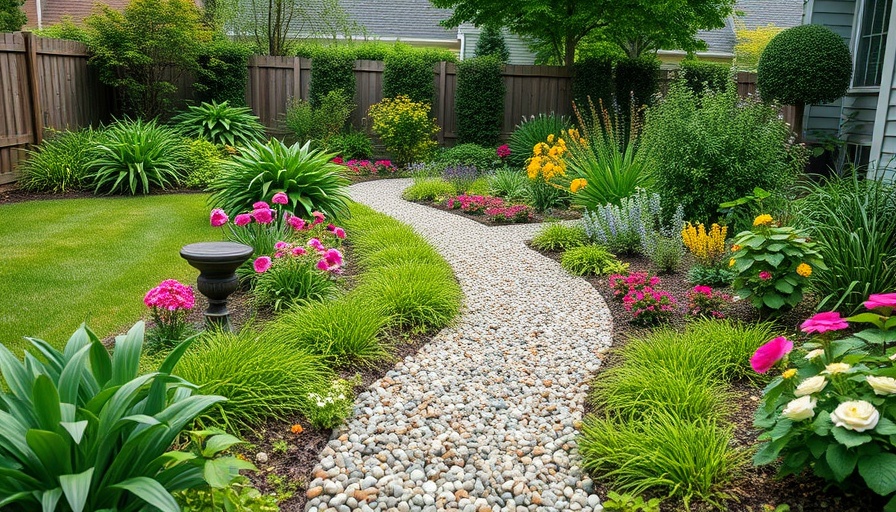
The Vital Role of Garden Drainage for Homeowners
For homeowners in Fairfield County, Connecticut, understanding garden drainage is crucial to maintaining a vibrant outdoor space. Proper drainage not only protects your investments in landscaping but also enhances home aesthetic and contributes positively to the local environment. Without it, gardens can suffer from a myriad of problems, including waterlogged soil that leads to root rot, or excessively dry patches that stress your plants and make them vulnerable to disease.
How to Assess Your Garden's Drainage Needs
One of the first steps in ensuring your garden drainage is effective is to perform a simple percolation test. To do this, dig a hole about one foot deep and fill it with water. Observe how quickly the water drains—this will indicate if your garden requires enhanced drainage solutions. Homeowners often overlook this crucial step, but it is essential for ensuring plants receive the right balance of moisture.
Choosing the Right Plants: Nature’s Own Solution
When designing your garden, it's important to select plants that match your soil’s drainage conditions. Some species thrive in well-drained soils while others prefer moisture-rich environments. By choosing native plants, especially those accustomed to local climate and soil conditions, homeowners can foster a low-maintenance garden that flourishes naturally.
Enhancing Soil Structure for Optimal Drainage
Improving soil structure is another effective method of enhancing drainage. Incorporate organic matter such as compost and well-rotted manure into your soil to aid in moisture retention while allowing for proper drainage. For particularly heavy clay soils, mixing in materials like grit or sand can help break it up, encouraging better air flow and water movement.
Advantages of Raised Garden Beds
Creating raised garden beds could be one of the best decisions for homeowners facing persistent drainage issues. Not only do they elevate your planting area to prevent water pooling, but they also provide an attractive component to your landscape. Raised beds allow for better runoff and can be designed to suit a variety of plants, effectively combining beauty and functionality.
Implementing Effective Drainage Systems
For gardens experiencing extreme drainage problems, homeowners might consider installing drainage systems like French drains or gravel trenches. These systems divert excess water away from the root zones of plants, minimizing the risk of water damage. Such infrastructural solutions require an initial investment but can save both time and effort in the long run, protecting your garden during heavy rain.
The Importance of Regular Maintenance
Once you have a solid drainage system in place, regular maintenance will help keep it functioning properly. Homeowners should monitor rainfall patterns, watch for signs of standing water, and make adjustments as needed. Compaction of soil—often caused by heavy foot traffic or machinery—can impede drainage, so be cautious about how you care for your garden pathways.
Utilizing Mulch for Enhanced Drainage
Mulching is a technique often underutilized by homeowners looking to improve their gardens. Organic mulch not only suppresses weeds and retains moisture but also contributes to soil aeration. As it decomposes, it adds nutrients to the soil and helps maintain a loose structure, allowing water to penetrate more freely. This helps to ensure that your plants can benefit from sustained moisture levels without being waterlogged.
Rerouting Excess Water with Smart Solutions
Homeowners can also implement proactive strategies to manage excess water. Rain barrels can collect runoff and be repurposed for irrigation during dry spells, while swales can help redirect water flow during heavy rains. Such techniques not only protect your garden from flooding but also encourage mindful water usage, ultimately contributing to environmental conservation.
Adapting to Climate Change Challenges
With extreme weather conditions becoming more common, it is essential for homeowners to consider the long-term viability of their drainage plans. Adapting to these changes will ensure that your garden remains productive and beautiful regardless of climate shifts. Investing in strategies that promote resilience will ultimately lead to cost savings and enhanced garden health.
In Fairfield County, Connecticut, mastering garden drainage is a key element of successful lawn care and landscaping practices that every homeowner should prioritize. By understanding the unique drainage needs of your garden, improving soil structure, and applying the right gardening techniques, you can foster an environment where plants thrive.
Take Charge of Your Garden’s Health Today
Don't let poor drainage hold back your gardening aspirations! Assess your garden now, choose the right plants, and implement the recommended strategies to ensure a flourishing outdoor space. Embrace these changes today for a healthier tomorrow.
 Add Row
Add Row  Add
Add 




Write A Comment